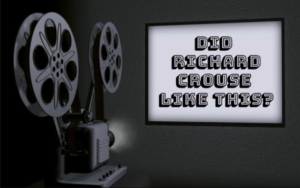Posts Tagged ‘Liev Schreiber’
Sunday, August 27th, 2023
Watxch the whole thing HERE
Tags: = the Yom Kippur War , Archie Madekwe , Beau Bridges , Bill Pohlad , biographical drama , biographical drama film , Camille Cottin , Casey Affleck , Darren Barnet , David Harbour , Djimon Hounsou , Donnie and Joe Emerson , Dreamin' Wild , Emelia Hartford , Geri Halliwell Horner , Golda , Golda Meir , Gran Turismo , Gran Turismo: Based on a True Story , Guy Nattiv , Helen Mirren , Jann Mardenborough , Jason Hall , Liev Schreiber , Neill Blomkamp , Nicholas Martin , Noah Jupe , Orlando Bloom , Prime Minister of Israel , Telemarketers , Walton Goggins , Winning Time , Zach Baylin , Zooey Deschanel Film Review | Comments Off on CTV NEWS AT SIX: NEW MOVIES AND TV SHOWS TO CHECK OUT THIS WEEKEND!
Sunday, August 27th, 2023
Watch the whole thing HERE
Tags: = the Yom Kippur War , Archie Madekwe , Beau Bridges , Bill Pohlad , biographical drama , biographical drama film , Camille Cottin , Casey Affleck , Darren Barnet , David Harbour , Djimon Hounsou , Donnie and Joe Emerson , Dreamin' Wild , Emelia Hartford , Geri Halliwell Horner , Golda , Golda Meir , Gran Turismo , Gran Turismo: Based on a True Story , Guy Nattiv , Helen Mirren , Jann Mardenborough , Jason Hall , Liev Schreiber , Neill Blomkamp , Nicholas Martin , Noah Jupe , Orlando Bloom , Prime Minister of Israel , Walton Goggins , Zach Baylin , Zooey Deschanel Film Review | Comments Off on YOU TUBE: THREE MOVIES/THIRTY SECONDS! FAST REVIEWS FOR BUSY PEOPLE!
Saturday, August 26th, 2023
Watch the whole thing HERE
Tags: = the Yom Kippur War , Archie Madekwe , Beau Bridges , Bill Pohlad , biographical drama , biographical drama film , Camille Cottin , Casey Affleck , Darren Barnet , David Harbour , Djimon Hounsou , Donnie and Joe Emerson , Dreamin' Wild , Emelia Hartford , Geri Halliwell Horner , Golda , Golda Meir , Gran Turismo , Gran Turismo: Based on a True Story , Guy Nattiv , Helen Mirren , Jann Mardenborough , Jason Hall , Liev Schreiber , Neill Blomkamp , Nicholas Martin , Noah Jupe , Orlando Bloom , Prime Minister of Israel , Telemarketers , Walton Goggins , Winning Time , Zach Baylin , Zooey Deschanel Film Review | Comments Off on CTV NEWS ATLANTIC AT SIX: RICHARD ON WHAT TO WATCH THIS WEEKEND!
Saturday, August 26th, 2023
Listen to the whole thing HERE
Tags: = the Yom Kippur War , Archie Madekwe , Beau Bridges , Bill Pohlad , biographical drama , biographical drama film , Camille Cottin , Casey Affleck , Darren Barnet , David Harbour , Djimon Hounsou , Donnie and Joe Emerson , Dreamin' Wild , Emelia Hartford , Geri Halliwell Horner , Golda , Golda Meir , Gran Turismo , Gran Turismo: Based on a True Story , Guy Nattiv , Helen Mirren , Jann Mardenborough , Jason Hall , Liev Schreiber , Neill Blomkamp , Nicholas Martin , Noah Jupe , Orlando Bloom , Prime Minister of Israel , Walton Goggins , Zach Baylin , Zooey Deschanel Film Review | Comments Off on NEWSTALK TONIGHT WITH JIM RICHARDS: DOES RICHARD CROUSE LIKE THESE MOVIES?
Friday, August 25th, 2023
Watch the whole thing HERE
Tags: = the Yom Kippur War , Archie Madekwe , Beau Bridges , Bill Pohlad , biographical drama , biographical drama film , Camille Cottin , Casey Affleck , Darren Barnet , David Harbour , Djimon Hounsou , Donnie and Joe Emerson , Dreamin' Wild , Emelia Hartford , Geri Halliwell Horner , Golda , Golda Meir , Gran Turismo , Gran Turismo: Based on a True Story , Guy Nattiv , Helen Mirren , Jann Mardenborough , Jason Hall , Liev Schreiber , Neill Blomkamp , Nicholas Martin , Noah Jupe , Orlando Bloom , Prime Minister of Israel , Walton Goggins , Zach Baylin , Zooey Deschanel Film Review | Comments Off on RICHARD’S WEEKEND MOVIE REVIEWS FROM CP24! FRIDAY AUGUST 25, 2023.
Friday, August 25th, 2023
Watch the whole thing HERE
Tags: = the Yom Kippur War , Archie Madekwe , Beau Bridges , Bill Pohlad , biographical drama , biographical drama film , Camille Cottin , Casey Affleck , Darren Barnet , David Harbour , Djimon Hounsou , Donnie and Joe Emerson , Dreamin' Wild , Emelia Hartford , Geri Halliwell Horner , Golda , Golda Meir , Gran Turismo , Gran Turismo: Based on a True Story , Guy Nattiv , Helen Mirren , Jann Mardenborough , Jason Hall , Liev Schreiber , Neill Blomkamp , Nicholas Martin , Noah Jupe , Orlando Bloom , Prime Minister of Israel , Walton Goggins , Zach Baylin , Zooey Deschanel Film Review | Comments Off on RICHARD’S CTV NEWSCHANNEL WEEKEND REVIEWS FOR FRIDAY AUGUST 25, 2023!
Friday, August 25th, 2023
Watch the whole thing HERE
Tags: = the Yom Kippur War , Archie Madekwe , Beau Bridges , Bill Pohlad , biographical drama , biographical drama film , Camille Cottin , Casey Affleck , Darren Barnet , David Harbour , Djimon Hounsou , Donnie and Joe Emerson , Dreamin' Wild , Emelia Hartford , Geri Halliwell Horner , Golda , Golda Meir , Gran Turismo , Gran Turismo: Based on a True Story , Guy Nattiv , Helen Mirren , Jann Mardenborough , Jason Hall , Liev Schreiber , Neill Blomkamp , Nicholas Martin , Noah Jupe , Orlando Bloom , Prime Minister of Israel , Walton Goggins , Zach Baylin , Zooey Deschanel Film Review | Comments Off on RICHARD’S CP24 WEEKEND REVIEWS & VIEWING TIPS! FRIDAY AUGUST 25, 2023.
Friday, August 25th, 2023
Listen to the whole thing HERE
Tags: = the Yom Kippur War , Archie Madekwe , Beau Bridges , Bill Pohlad , biographical drama , biographical drama film , Camille Cottin , Casey Affleck , Darren Barnet , David Harbour , Djimon Hounsou , Donnie and Joe Emerson , Dreamin' Wild , Emelia Hartford , Geri Halliwell Horner , Golda , Golda Meir , Gran Turismo , Gran Turismo: Based on a True Story , Guy Nattiv , Helen Mirren , Jann Mardenborough , Jason Hall , Liev Schreiber , Neill Blomkamp , Nicholas Martin , Noah Jupe , Orlando Bloom , Prime Minister of Israel , Walton Goggins , Zach Baylin , Zooey Deschanel Film Review | Comments Off on CKTB NIAGARA REGION: THE TIM DENIS SHOW WITH RICHARD CROUSE ON MOVIES!
Friday, August 25th, 2023
Listen to the whole thing HERE
Tags: = the Yom Kippur War , Archie Madekwe , Beau Bridges , Bill Pohlad , biographical drama , biographical drama film , Camille Cottin , Casey Affleck , Darren Barnet , David Harbour , Djimon Hounsou , Donnie and Joe Emerson , Dreamin' Wild , Emelia Hartford , Geri Halliwell Horner , Golda , Golda Meir , Gran Turismo , Gran Turismo: Based on a True Story , Guy Nattiv , Helen Mirren , Jann Mardenborough , Jason Hall , Liev Schreiber , Neill Blomkamp , Nicholas Martin , Noah Jupe , Orlando Bloom , Prime Minister of Israel , Walton Goggins , Zach Baylin , Zooey Deschanel Film Review | Comments Off on CFRA IN OTTAWA: THE BILL CARROLL MORNING SHOW MOVIE REVIEWS!
 I appear on “CTV News at 6” to talk about the best movies and television to watch this weekend. This week I have a look at “Gran Turismo,” “Golda” and “Dreamin’ Wild,” all playing on theatres, and “Winning Time” and “Telemarketers,” both playing on Crave.
I appear on “CTV News at 6” to talk about the best movies and television to watch this weekend. This week I have a look at “Gran Turismo,” “Golda” and “Dreamin’ Wild,” all playing on theatres, and “Winning Time” and “Telemarketers,” both playing on Crave.







